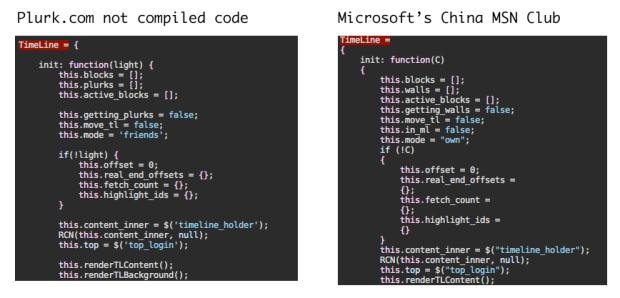 Microblogging startup Plurk may not have become hugely popular in these parts, where Twitter rules the lands, but it has been making strides in Asia. Recently, the fledgling company has gotten a feared competitor in the space with the launch of MSN Juku in China by the local Microsoft subsidiary, in a country where Plurk has notably been blocked since April this year.
Microblogging startup Plurk may not have become hugely popular in these parts, where Twitter rules the lands, but it has been making strides in Asia. Recently, the fledgling company has gotten a feared competitor in the space with the launch of MSN Juku in China by the local Microsoft subsidiary, in a country where Plurk has notably been blocked since April this year.
But the software giant may well have cut a few corners here and there to get their service up and running, and has seemingly turned to outright theft of code and design elements of Plurk to launch in a hurry.
The design of MSN Juku sure has the same looks as Plurk, as you can tell from the screenshots below. But according to a blog post by the microblogging startup, there’s more going on than just design inspiration:
– Microsoft China officially launched its own microblogging service, MSN Juku/Hompy/Mclub, some time in November, 2009.
– The service’s design and UI is by and large an EXACT copy of Plurk’s innovative left-right timeline scrolling navigation system. (see screen captures below)
– Some 80% of the client and product codebase appears to be stolen directly from Plurk! (see evidence below).
– Plurk was never approached nor collaborated in any capacity with MS on this service.As a young startup, we’re stunned, shocked, and unsure what to do next and need your support and suggestions.
Piggybacking off a similar service’s design is one thing, but effectively going in and steal code? MSN Juku looks too similar to be a coincidence, and Plurk most certainly provides some really good evidence of code theft in its post to bargain.
We’ve reached out to Microsoft to get their side of the story and will update when we hear back.
If this is what we think it is, though, shame to Redmond.
Update – for now, this is the statement:
“Microsoft takes intellectual property seriously, and we are currently investigating these allegations. It may take some time due to the time zone differences with Beijing.”
Update 2: Another statement from Microsoft.
(Thanks for the heads up, Amir)

